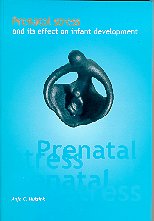

 Prenatal stress and its effect on infant development
Prenatal stress and its effect on infant developmentPrenatal stress and its effect on infant development / Anja Christina Huizink - [S.l.] : [s.n.], 2000 - Tekst. - Proefschrift Universiteit Utrecht
NBC: 44.92 : gynaecologie, verloskunde
Trefwoorden: Prenatal stress, Infant development, Temperament, Pregnancy, Risk factors, Cortisol
ACTH
ABSTRACT: In this dissertation the effect of prenatal maternal stress on infant development and behavior is discussed. In a prospective longitudinal study of 170 nulliparous women, data was gatheren on the maternal stress level three times during pregnancy by means of questionnaires and endocrinologic parameters (Cortisol, ACTH). After birth, the infants were examined up to the age of 8 months with the Bayley Scales of Infant Development and their behavior was rated by observation and by maternal report (Infant Characteristics Questionnaire; ICQ, Bates). The dissertations starts with a systematic review of studies concerning the influence of prenatal maternal stress on animal offspring. Next, the fears and stessors in human pregnancy are discussed in the preceeding chapters. In particular, pregnancy related anxieties and coping with stressors in a normal risk pregnancy are analyzed in detail. In addition, a multidimensional model of prenatal stress is presented. After describing the concept of prenatal maternal stress in humans, the effect of prenatal maternal stress on infant development and behavior are discussed. It is found that especially pregnancy-specific nxieties are negatively related to infant mental and motor development. In addition, women who experienced many fears during pregnancy have an increased risk of getting an infant with adaptational problems and difficult behavior in the first 8 months of life. Implications for clinical practice and recommendations for future research are offered. |

